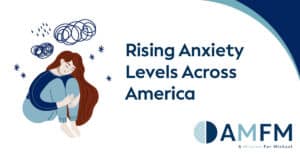Schizophrenia most commonly presents itself in young adulthood. Men are most likely to begin exhibiting symptoms in their early 20s, while women are more likely to exhibit the first symptoms in their late 20s.
Early onset schizophrenia refers to schizophrenia that presents itself earlier than normal, specifically between the ages of 13 and 18. The prevalence of early onset schizophrenia is unknown, but it is thought to be nearly as rare as childhood onset schizophrenia. COS occurs in an estimated 1 in 40,000 children.
Many of the signs and symptoms of early onset schizophrenia are in line with signs and symptoms of adult onset schizophrenia. However, they can be more severe for children and it can be difficult for them to function later in life.
Read on to find out more about early onset schizophrenia and what your treatment options are.
What Causes Schizophrenia?
Unfortunately, the exact cause of schizophrenia is unknown. Scientists believe that genetics and brain development play a key role in the development of schizophrenia. It is also generally believed that emotional and environmental factors can trigger the onset of the disease.
Some of these environmental factors may occur before birth. There has been some indication that exposure to drugs, illness, and malnutrition in the womb has the potential to lead to schizophrenia.
It is also fairly common for people with schizophrenia to have undergone some form of trauma or psychological stress. Traumatic stress can cause lasting damage to the brain, especially during childhood and adolescence. The brain is already undergoing many changes around the time puberty sets in and the additional strain of trauma may have something to do with schizophrenia.
It is unclear what causes childhood onset schizophrenia. Early onset schizophrenia is often studied similarly to adult onset schizophrenia, as puberty has already taken place. Additionally, many of the factors that are thought to contribute to adult onset schizophrenia are present in adolescents.
Signs of Early Onset Schizophrenia
It can be difficult to recognize early onset schizophrenia because so many of the signs are congruous with normal teenage changes and behaviors. Plus, the adolescent is unlikely to notice, themselves, that these changes may indicate something more than normal growing pains.
It’s important to note that while many of these signs do resemble standard teenage behavior, it’s not as common for a normally developing teen to check all of these boxes. In addition, things like hallucinations and delusions are certainly not normal, and should always be taken seriously.
Social Withdrawal
An early sign of schizophrenia is social withdrawal. The individual may express disinterest in their friends and family or even distrust of people as a whole.
They also may drop their existing friends in favor of a new group of people. This may be fleeting or it may become a new pattern.
Worsening Grades
As the brain alters, you may notice a bit of reversion in certain cognitive skills. It may become harder for the individual to focus on or retain information. They may also simply lose interest in things like school and let their grades go by the wayside.
If you notice worsening grades, it may be a good idea to consult with a trusted teacher. They can provide more insight into what’s going on in the classroom and whether it seems like your teen is struggling to keep up or not pay attention.
Altering Mood
Schizophrenia tends to coexist with other mental illnesses such as depression, anxiety, and poor anger management.
Mood swings are fairly common, and you might notice the individual switching from a state of mania to a state of extreme agitation. Alternatively, it may appear that their mood has flattened altogether. They may not show signs of interest, happiness, or affection.
While these changes in mood may be more pressing or obvious than any other signs, it’s important to keep a lookout for what else is happening in addition to altering moods. Otherwise, you may go down a path of misdiagnosis that could lead to the wrong (or inadequate) medications.
Hallucinations
It’s possible that adolescents with early onset schizophrenia are more likely to experience visual hallucinations than adults. Overall, auditory hallucinations are thought to be more common in all people with schizophrenia than visual hallucinations.
For people with schizophrenia, hallucinations will seem completely real. They will not know (and may not believe) that they aren’t, even if someone else confirms that they aren’t.
Scrambled Thoughts
In the early stages of schizophrenia, you may notice that the individual can’t seem to keep their thoughts straight. This may come out in the way they try to explain their thoughts or even the way they order words. This is one of the signs that should never be ignored, as it is in no way linked to normal adolescent development.
Movement Disorders
Finally, some adolescents with early onset schizophrenia develop movement disorders. This could manifest through rapid and repetitive movements, like arm flapping or head shaking. It could also manifest in a complete lack of movement or responsiveness.
How to Treat Early Onset Schizophrenia
As soon as you notice the signs of early onset schizophrenia, it’s time to begin running tests and seeking a diagnosis. Your doctor will decide on a medication regimen.
Doctors will need to closely monitor the progress of the adolescent to make sure the medication regimen is working and adjust as needed. With the right combination, many of the symptoms will become more manageable.
Adolescents with schizophrenia should also get psychological treatment in the form of therapy. Coping with schizophrenia and its symptoms can lessen their quality of life. Therapy can give them the tools to cope in a healthy and productive way.
In-Patient Treatment for Young Adults with Schizophrenia
Unfortunately, adolescents who develop early onset schizophrenia will experience the symptoms of schizophrenia into adulthood. Whether they stagnate or worsen, there are plenty of treatment options for them that can improve their mental health and their lives.
At A Mission for Michael, we treat clients with schizophrenia with a diverse treatment plan. We balance the latest research and medical treatment with compassion and top-of-the-line psychological treatment. Learn more about our program so you can decide if it’s the right fit for you.









